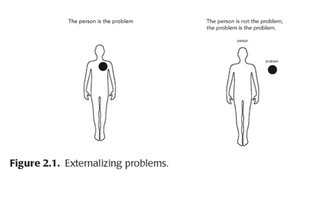Personal Narratives: Reclaim Your Past & Envision Your Future.
Book Review: Everyday Narrative Therapy to Draw Inspiration & Transform Experience, David Denborough

Highly recommended to those seeking solutions or simply curious minds! A rather interesting read by David Denborough and Michael White, the creator of Narrative Therapy. It is a method of storytelling that helps with healing from and coping with trauma (of any kind, individual, group, or community).
This book discusses the retelling of our personal narrative to one that is more positive by first addressing how we talk about the problems in our life.
“All too often, the stories we believe about ourselves have been written by others.”
Internalizing Problems.
We commonly understand problems as located “inside people”.
i.e: “I am an anxious person”
Therefore, we often address ourselves as the problem, and it becomes demoralizing and overwhelming to know what to do. As Denborough says “all we can do is take action against ourselves”.
The alternative is to Externalize Problems.
Separate yourself from the problem, this makes it easier to revise the relationship allowing you to take a position on the problem, so you know where you, and the problem stands. This can be difficult especially if a person believes they are the problem.
i.e: "I'm an anxious person" - Internalization
vs "The feeling of anxiousness is strongest when I'm in a crowded room - Externalization

“The person is not the problem. The problem is the problem.”Michael White
Steps to retelling Your Story:
Name the problem.
“How long has The Anxiety been influencing you?”Personify the problem.
“How can we out-trick Mr.Anxiety?”Investigate the influence and operations of the problem.
“What are the places The Anxiety is most powerful?”Explore the effects of the problem.
“What are the effects of The Anxiety at home, work or school?”Evaluate the effects of the problem.
“Are the effects of the problem positive, negative or both?”Ask why.
“Why do you want to change your relationship with this problem?”Take a position in relation to the problem.
Decide how to change the relationship with the problem.
ie: Choose to either walk out of the problem, disempower the problem, educate the problem, etc.Outlets.
~ Some people write a letter to the problem or someone facing a similar predicament.
~ Have collective conversations (i.e.: Oprah style). Group conversations can be very illuminating and free-ing. You can always learn something new from someone else's experience.Special Skills.
Special skills are rituals that help with the transition to healing, any skill, knowledge or value that helps friends, family or yourself get through difficult times (music, pets, humor, friends, etc).
~ You can reduce the influence of the problem, and increase your influence on the problem with the help of special skills. This usually creates Unique Outcomes.
ie: Walking into a crowded space and thinking of holding her mother's hand, Sarah felt less anxious. Remembering holding her mother's hand when in crowded areas produced a unique outcome of less anxiety in Sarah.Research.
Denborough suggests writing down in two columns, times and places where the problem was less strong, activities you were involved in, who were you with, what were your thoughts, did you do anything to prepare yourself prior?
In the other column, write times and places where the problem was most strong, etc.
Essentially, it is understanding the very fabric of affect and effect.
As with everything, once understood a thing loses power. I’ve always believed in the power of Self. Call it the law of attraction, the secret, energy, positive thinking, subconscious messages, the stories we tell ourselves shape our lives. Words have power.
Shop it: Amazon & Kindle
This post has been ranked within the top 10 most undervalued posts in the second half of Apr 30. We estimate that this post is undervalued by $12.54 as compared to a scenario in which every voter had an equal say.
See the full rankings and details in The Daily Tribune: Apr 30 - Part II. You can also read about some of our methodology, data analysis and technical details in our initial post.
If you are the author and would prefer not to receive these comments, simply reply "Stop" to this comment.